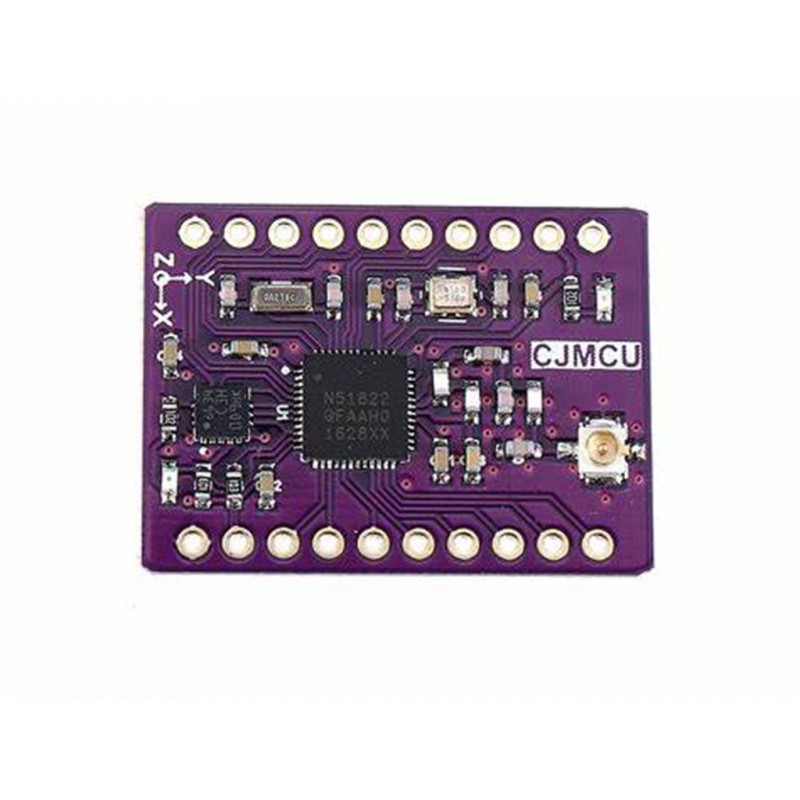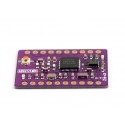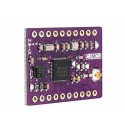Bluetooth And Acceleration Sensor Development Board Bluetooth Three Axis Accelerometer Module Nrf51822 And Lis3Dh
Rs. 586.00 Rs. 669.00
- Brand: https://www.st.com/en/mems-and-sensors/lis3dh.html, https://www.
- Product Code: SEN-ACCELEROMETER
- Availability: In Stock
- Price in reward points: 7
- For Bulk Order
 9962060070
9962060070
SPECIFICATION:
-2.4 GHz multiprotocol RF transceiver
-ARM® Cortex™-M0 32 bit processor
-128 bit AES HW encryption
-256kB flash & 16kB RAM
-Programmable Peripheral Interconnect (PPI)
-Digital interfaces: SPI, I2C, UART
-10 bit ADC
-Programmable output power: -20 to +4 dBm
-Independent application development and protocol stack
-Fully compatible with NRF24L series
-Pinout compatible with NRF51xxx series
-Global separate power management
-Operating voltage: 1.8 V ~ 3.6 V
-Wide supply voltage, 1.71V to 3.6V
-Independent IOs supply (1.8 V) and supply voltage compatible
-Ultra low-power mode consumption down to 2 μA
-±2g/±4g/±8g/±16g dynamically selectable fullscale
-I2C/SPI digital output interface
-16 bit data output
-2 independent programmable interrupt generators for free-fall and motion detection
-6D/4D orientation detection
-Free-fall detection
-Motion detection
-Embedded temperature sensor
-Embedded self-test
-Embedded 96 levels of 16 bit data output FIFO
-10000 g high shock survivability
-ECOPACK® RoHS and “Green” compliant
OVERVIEW:
-Wide supply voltage, 1.71V to 3.6V
-Independent IOs supply (1.8 V) and supply voltage compatible
-Ultra low-power mode consumption down to 2 μA
-±2g/±4g/±8g/±16g dynamically selectable fullscale
-I2C/SPI digital output interface
-16 bit data output
-2 independent programmable interrupt generators for free-fall and motion detection
-6D/4D orientation detection
-Free-fall detection
-Motion detection
-Embedded temperature sensor
-Embedded self-test
-Embedded 96 levels of 16 bit data output FIFO
-10000 g high shock survivability
-ECOPACK® RoHS and “Green” compliant
PACKAGE INCLUDES:
1 PCS x Bluetooth 3 Axis Accelerometer Module Nrf51822 And Lis3Dh
https://www.st.com/en/mems-and-sensors/lis3dh.html
https://www.nordicsemi.com/Products/Low-power-short-range-wireless/nRF51822
//SOURCE CODE TAKEN FROM BELOW LINK
//https://github.com/adafruit/Adafruit_LIS3DH/blob/master/examples/acceldemo/acceldemo.ino
/ Basic demo for accelerometer readings from Adafruit LIS3DH
#include <Wire.h>
#include <SPI.h>
#include <Adafruit_LIS3DH.h>
#include <Adafruit_Sensor.h>
// Used for software SPI
#define LIS3DH_CLK 13
#define LIS3DH_MISO 12
#define LIS3DH_MOSI 11
// Used for hardware & software SPI
#define LIS3DH_CS 10
// software SPI
//Adafruit_LIS3DH lis = Adafruit_LIS3DH(LIS3DH_CS, LIS3DH_MOSI, LIS3DH_MISO, LIS3DH_CLK);
// hardware SPI
//Adafruit_LIS3DH lis = Adafruit_LIS3DH(LIS3DH_CS);
// I2C
Adafruit_LIS3DH lis = Adafruit_LIS3DH();
void setup(void) {
Serial.begin(115200);
while (!Serial) delay(10); // will pause Zero, Leonardo, etc until serial console opens
Serial.println("LIS3DH test!");
if (! lis.begin(0x18)) { // change this to 0x19 for alternative i2c address
Serial.println("Couldnt start");
while (1) yield();
}
Serial.println("LIS3DH found!");
// lis.setRange(LIS3DH_RANGE_4_G); // 2, 4, 8 or 16 G!
Serial.print("Range = "); Serial.print(2 << lis.getRange());
Serial.println("G");
// lis.setDataRate(LIS3DH_DATARATE_50_HZ);
Serial.print("Data rate set to: ");
switch (lis.getDataRate()) {
case LIS3DH_DATARATE_1_HZ: Serial.println("1 Hz"); break;
case LIS3DH_DATARATE_10_HZ: Serial.println("10 Hz"); break;
case LIS3DH_DATARATE_25_HZ: Serial.println("25 Hz"); break;
case LIS3DH_DATARATE_50_HZ: Serial.println("50 Hz"); break;
case LIS3DH_DATARATE_100_HZ: Serial.println("100 Hz"); break;
case LIS3DH_DATARATE_200_HZ: Serial.println("200 Hz"); break;
case LIS3DH_DATARATE_400_HZ: Serial.println("400 Hz"); break;
case LIS3DH_DATARATE_POWERDOWN: Serial.println("Powered Down"); break;
case LIS3DH_DATARATE_LOWPOWER_5KHZ: Serial.println("5 Khz Low Power"); break;
case LIS3DH_DATARATE_LOWPOWER_1K6HZ: Serial.println("16 Khz Low Power"); break;
}
}
void loop() {
lis.read(); // get X Y and Z data at once
// Then print out the raw data
Serial.print("X: "); Serial.print(lis.x);
Serial.print(" \tY: "); Serial.print(lis.y);
Serial.print(" \tZ: "); Serial.print(lis.z);
/* Or....get a new sensor event, normalized */
sensors_event_t event;
lis.getEvent(&event);
/* Display the results (acceleration is measured in m/s^2) */
Serial.print("\t\tX: "); Serial.print(event.acceleration.x);
Serial.print(" \tY: "); Serial.print(event.acceleration.y);
Serial.print(" \tZ: "); Serial.print(event.acceleration.z);
Serial.println(" m/s^2 ");
Serial.println();
delay(200);
}
© 2021 GitHub, Inc.
15 days



